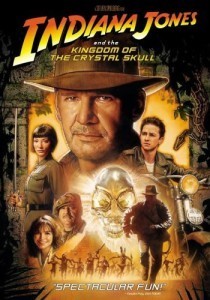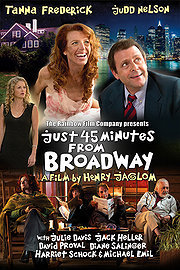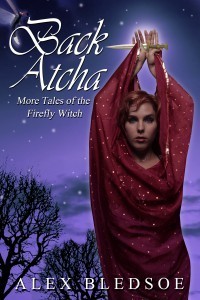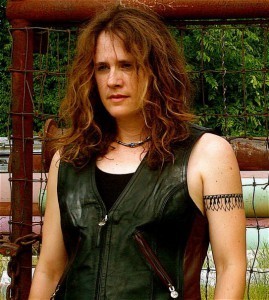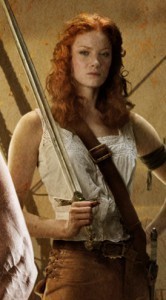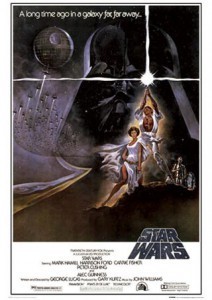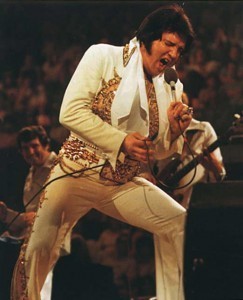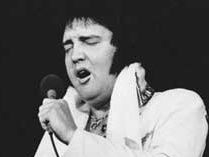Alex Bledsoe's Blog, page 24
September 18, 2012
The Indy Challenge: Melissa Olson on Kingdom of the Crystal Skull
Today the four Indiana Jones films are released on blu-ray, along with a host of special features (including the awesome TV special, The Making of Raiders of the Lost Ark, which I’ve had on VHS for decades). To commemorate this, author Melissa Olson (Dead Spots) and I have agreed to swap blog posts defending the most maligned entries in the series. At her blog I’ll be making the case for Indiana Jones and the Temple of Doom, and here she sings the praises of Indiana Jones and the Kingdom of the Crystal Skull.
Greetings, my fellow Alex Bledsoe fans. I’m glad you could join me for this half of the Indiana Jones challenge. Some would say that I’m getting the short end of the stick by having to defend the series’ fourth movie, but I beg to differ. Now, I have no intention of using this blog to argue that Indiana Jones and the Kingdom of the Crystal Skull is a Great Film. It isn’t, certainly not the way Raiders of the Lost Ark and Last Crusade are undeniably Great Films, which I believe Alex and I would agree on. But the thing about Crystal Skull is, it also shouldn’t be what it has become: an easily dismissed joke of a movie. Because when Spielberg and Lucas set out to make Crystal Skull, they tried something fascinating. And while it didn’t really work, not the way they wanted it to, Kingdom of the Crystal Skull is not just another tacky piece-of-crap sequel that came out way too late and was thrown together way too shoddily (I’m looking at you, Wall Street 2 and Basic Instinct 2). There’s a line of reasoning here, a story behind Crystal Skull that you might not know about. It’s interesting. Here’s why.
Unfortunately, you’ll have to bear with me for a bit of history first, because in order to really understand Crystal Skull, you have to go back to what influenced the entire series in the first place. In the late 1970’s/early 1980’s, the US was experiencing a sudden pull towards nostalgia: the 70’s had been such a complex period, politically and socially, that there was a certain anxiety and fear in the air, a general longing for simpler, more fun times. Filmmaker George Lucas managed to have absolutely flawless timing with the release of Star Wars, which gave the people exactly what they wanted. Star Wars combined elements of beloved 1930’s serials with bits and pieces of other traditional genres: samurai stories, war epics, westerns. Star Wars is a really good movie, but it’s stupendous success owes a lot to the perfect timing of supply and demand, a match of cutting-edge technology and nostalgia for simpler stories from simpler times.
A few years later, Lucas and his pal Spielberg were kicking around some ideas for how to do it again: make a nostalgic adventure film that was deeply influenced by the style of the 1930’s serials, but still had the best technology and grandeur that 1981 had to offer. They set it in 1936 to embody the spirit of those serials, and decided to involve the world’s biggest villain at that time: Hitler. They stumbled on the historical fact that Hitler was interested in the occult, pulled in Lucas’ interest in archeology, and ran with it. Raiders of the Lost Ark twists in themes of spiritual exploration, the potential danger in a search for knowledge, the power of faith and trust, and so on. And it featured the same sort of cartoonish stunts and exaggerated facial expressions that made those serials so popular in the 30’s: an enormous pit of deadly snakes, spirits that whip around and melt the faces off the Nazis, a gigantic boulder that almost rolls over Indy, and so on.
Fast forward twenty-some years. Let’s take a moment, people, to pause and pretend that we are the mighty triumvirate of Spielberg, Lucas, and Ford. Collectively and individually, we have more money than Marie Antoinette could spend in twelve lifetimes. In addition to our individual successes, we’ve already made a beloved, timeless trilogy together that (with the possible exception of Temple of Doom, which, in addition to pretty much lacking a plot, is so saturated with obscene female and Asian stereotypes that you can breathe them in and die of bigotry) actually holds up thirty years later. The three of us miss working together, and we miss the characters and themes we built for Indiana Jones. But…we are also older, and to do a fourth film now, when Indy himself would be so obviously changed, doesn’t make any sense. There’s just no way to follow the formula of the first three films with Dr. Jones as an older guy.
But wait. Suddenly, there’s a spark. An idea, if you will. Because after 9/11, and all the political and social turmoil that followed it, wouldn’t audiences enjoy getting back to nostalgia again? What if we could have it both ways? What if we could return to the spirit of Indiana Jones, but update it for a different age?
There was no way to get around the age problem, of course. Dr. Jones had to be aged about 20 years after Raiders, which put the story in 1957. So Spielberg and Lucas did the exact same thing they did with Raiders: they cast the real-life villain from that time period, which in this case was the Soviet Union – Communists. With that basic premise, Spielberg and Lucas put their thinking caps on. How to update Indy while keeping the same themes of spiritual exploration, the potential danger in a search for knowledge, the power of faith and trust, and so on? How could they revive the series but still bring in something new?
So they did what they did with Raiders: they focused on the pop culture of the period. Only instead of the serials from the 1930’s, they were looking at adding elements from the 1950’s favorite theme: Communists as aliens, aliens as Communists. The public’s biggest fear in the fifties was that the Commies would invade the US and turn good, hardworking American citizens into pod people, drones that were incapable of independent thought or action. And it was reflected in the American fiction of that time: Invasion of the Body Snatchers (1956), Thing From Another World (1951), Invaders from Mars (1953), and so on.
You see where I’m going with this, right? Lucas and Spielberg didn’t “jump the shark” by making Kingdom of the Crystal Skull. What they tried to do was the exact same thing they did with Raiders: they wanted to bring in the global villain and the global fear of that time, but still stir in Indiana Jones’s traditional search for truth, faith, knowledge, and especially, spirituality. In each of the first three films, Indiana Jones explores a spiritual outlook: Judaism, Hinduism, Christianity. And in the end, Indy always becomes a reluctant religious savior, a convert, however briefly. His fourth onscreen adventure does its best to continue that tradition, but this time, the religion being explored is knowledge. Stylistically, Crystal Skull does keep the original trilogy’s deference to the serials of the 30’s – the death-defying stunts, the exaggerated expressions, the derring-do – but adds in the themes from films of the 1950’s. And that, folks, is a pretty damned interesting prospect.
But it backfired, and frankly, that had a lot more to do with us than with them. Go back, for a second, to the outlandish success of Raiders of the Lost Ark, back in 1981. I doubt very much that movie theater audiences in ‘81 shouted and griped at the screen because the boulder trap or the convoy chase sequences were unrealistic and hokey. Or the river raft drop, or the monkey brain dinner, both in Temple of Doom. They didn’t complain because in 1981, the audiences wanted to believe in Indy. They wanted that nostalgia; they’d sought it out. And Spielberg and Lucas delivered. Wild success. Champagne and increased budgets all around.
In 2008 – and today – however, audiences don’t actually want to believe in Indy anymore. We might think that we do, but really, what we want to believe is that we are smart. We are not whores for the man, in this case represented by three rich middle-aged men trying to sell us an Indiana Jones movie about aliens, for crying out loud. We will not be taken in by that bullshit, thank you very much.
But think about it. Setting your personal beliefs in God or aliens aside for a moment, is the fridge-nuclear bomb scene really any less believable than spirits flying out of the Ark and melting Nazi faces? Is a crystal skull (and there is a fascinating, real-life history of those, by the way, go Wikipedia it) any less likely to have supernatural powers than an old chest, some magical rocks, or an ancient drinking glass? Nope. The difference isn’t in the material, it’s in us.
And that is where Spielberg and Lucas made their greatest mistake; it’s how Crystal Skull got put on the geek shit list for all eternity. They misjudged what we wanted. They thought these tumultuous times meant we’d be ready for another return to nostalgia, but what we really wanted was confirmation that even though 9/11, an economic crisis, and the destruction of the planet happened on our watch, we are redeemable because those things have made us smart, shrewd, and skeptical. (Oh, and we’ve also seen an additional twenty-odd-years worth of the best movie effects money can buy, so good luck impressing us, Indy team.)
So. Back to my mission statement: Indiana Jones and the Kingdom of the Crystal Skull is not a great movie. But it isn’t a mess, or an epic disaster, or an unholy blight on the face of a much-beloved piece of American popular culture. It’s not even the result of three rich guys getting lazy and trying to squeeze some more money out of something cool they did a long time ago. It’s just a bad call. It’s three smart guys trying to revive something they knew we loved in a way they thought was fresh. That they happened to be wrong doesn’t make it any less interesting. Maybe it even makes it more so. Because if the purpose of art is to hold a mirror up to society, then you can’t call Crystal Skull a failure. It did show us who we are. It just maybe wasn’t who we wanted to be.
September 17, 2012
Henry Jaglom and His Theatrical Families
Henry Jaglom’s newest film, Just 45 Minutes from Broadway,is an adaptation of his play about two generations of a Jewish theatrical family, and the secrets that come to light when one daughter brings home her “civilian” boyfriend.
For those unfamiliar with Jaglom’s work, he uses an improvisational style that blurs the edge between actor and character so that, to a degree no other filmmaker manages, it often feels as if you’re eavesdropping on real people. His films tend to involve ad hoc groups in restrictive settings (usually comfortable upper-scale homes), and his concerns around feminist issues (his series of “woman’s issue” films, for example, from Eating, to Going Shopping, to Babyfever). His work isn’t for everyone, and he has some vocal critics, but I treasure the sense of reality he presents.
Just 45 Minutes from Broadway is also an interesting bookend with another Jaglom film, 1995′s Last Summer in the Hamptons. That was the first Jaglom film I saw, and since then I’ve seen almost all his others. Interestingly, both these “theatrical” stories are fairly atypical of Jaglom’s usual concerns, but they share a family resemblance to each other. I have no real experience with the theatrical life, but both films show how seductive, and destructive, it can be.
In both films, an “outsider” figure comes into the well-established family, acting as the viewer surrogate. In Hamptons it’s Oona Hart (Victoria Foyt), a movie actress who’s recently starred in a smash superhero movie and now wants to get some real acting cred. In Broadway it’s James (Judd Nelson*), a real estate lawyer and fiance of one of the sisters. But while they’re similar figures, they’re actually opposites: Oona wants something from the Axelrods, and ultimately refuses to change, while James is there to meet his future in-laws, and ends up changing fundamentally.
The families, too, are similar. The Axelrods are preparing for the final performance of their annual theatrical review, while the Isaacs are facing the very real effects of the current economic downturn. In both films, the potential loss of a house represents the loss of the family unity. The Axelrods don’t really have a patriarch, but when your matriarch is the formidable Viveca Lindfors, you may not need one. The Isaacs are presided over by George and Vivian, theatrical veterans with family ties to the Yiddish theater. Sibling rivalry is also part of both, although Jack and Trish Axelrod are a bit more disturbed than the fairly upfront rivalry between Pandora and Betsy Isaacs.
Jaglom’s improvisational approach is a much bigger presence in Hamptons. Broadway feels more scripted (and that’s not a criticism), although the Seder dinner has the freewheeling, on-edge feel of a real social event. But it also means that Broadway stays more traditionally focused, and doesn’t meander (again, not a criticism) to the degree Hamptons does.
Both films are also showcases for Jaglom’s then-current muses. Foyt is terrific as a movie actress tempted by the “reality” of the theatrical life, but who ultimately can’t commit (her “baby seal” scene is great). And Frederick (as always showing everything her character feels at every moment) is luminous as the actress daughter worried that she can no longer exist either onstage or in the real world.
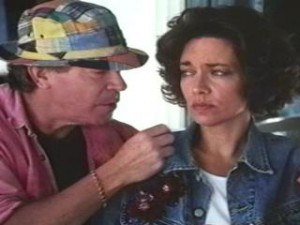
Jaglom (l) and Foyt
But the films have crucially different climaxes. Hamptons ends with the end: the final Axelrod showcase, after which the family home will be sold and the clan will likely no longer gather. Broadway ends with new beginnings, a more “traditional” romantic comedy ending but one that feels earned because of the affection generated for the characters.

Frederick (l) and Jaglom
As I said, I don’t have any real experience with theater, or theatrical families. But both the Axelrods and the Isaacs are people I’d love to visit for a weekend. I recommend both films for fans of ensemble acting, independent film and unique points of view.
*Never been a fan of Judd Nelson, but he’s absolutely great here. So I guess now I am a fan.
September 14, 2012
Writer’s Day #1
This is the first of a series of videos showing how a typical writer (i.e., me) works through the day. And my day starts early.
September 12, 2012
Announcing Firefly Witch Volume 3: Back Atcha
Available on Kindle as of right now, the third collection of Firefly Witch tales, Back Atcha.
In these three new short stories, the darkest adventures yet for the Firefly Witch, Tanna and Ry encounter their most vicious, diabolical and dangerous foes. One is a redneck who intends to sell his girlfriend to the devil, another is a serial killer with unexpected psychic powers, and the third is the hatred that leads people to barbarous acts of murder. Tanna must rely on her wits as well as her Wiccan beliefs, and Ry has to be stronger and smarter than he’s ever been, if they are to survive.
Buy it here for only $2.99!
AND DON’T MISS OUT: The second Firefly Witch collection, Croaked, is available FREE for the Kindle from Sept. 13-17.
September 10, 2012
The Ubiquitous Daddy Issues Club
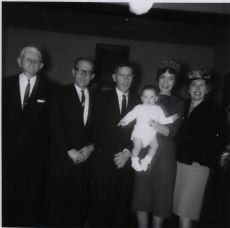
At my Christening, 1963. My dad’s in the middle. I’m the short one.
Recently I mentioned to author Patrick Somerville (This Bright River) that Dean Bakopoulos’s first book, Please Don’t Come Back from the Moon, resonated with me because I have unresolved issues with my own late father. Patrick said, “Yeah, like every other writer.” It wasn’t mockery: he was saying, in essence, “Welcome to a club of which you were already a member.”
That got me thinking: is it true? Does every writer, especially male writers, have deep-seated father issues? Do they provide some, or even all, of the drive that makes us create?
As if to corroborate this, a few days later I came across this passage in a New Yorker article on Bruce Springsteen:
“T-Bone Burnett said that rock and roll is all about ‘Daaaaddy!’ It’s one embarrassing scream of ‘Daaaaddy!’”
My father was, simply, an alcoholic. And he was surrounded by family and friends who so enabled and covered up for him that, until I was almost grown, I didn’t know. He never drank where I could see him. When he passed out on the couch, I was told he was just tired from working so hard. When he wanted to sit in the car instead of come inside with me for my weekly allergy shots, I thought he just found my company boring. Certainly we never talked books, music or art; he liked to fish (where he could drink), hunt (where he could drink) and go frog gigging (where he could drink).
Whenever he took me along for those activities, my presence frustrated him because it meant he couldn’t drink; to me, he just seemed put out by a son who didn’t grasp these skills instantly (we won’t even talk about him teaching me to drive). The upshot of which is that, pretty much up until right before he died, I assumed he just didn’t like me.
When I started drinking to fit in (at 15), no one took me aside and said, “This is what cost your father that good job, and made you have to move from that beautiful house into the one with a shotgun hole in the wall.” They simply clicked their tongues and shook their heads. Worse, he said nothing. His pride, or cowardice, kept him from even the most basic sort of intervention, telling his underage son that he shouldn’t get drunk.
Now that I’m a father, too, and fifteen years from my last drink (there was no drama around my quitting, just a realization that if I didn’t, I’d end up like him), I realize just how fucked up our relationship was, and how everyone around us let it stay fucked up. People are amazed that I missed what must have been obvious signs, but I was the only child at home, and I had nothing to compare it to. I believed what I was told, until the day I discovered him myself, passed out in the mud beside a pond where we’d gone fishing (and where he’d deliberately sent me to fish in a spot where I couldn’t see him).
Recently, over twenty years after his death, some workers at my mom’s house discovered a cache of empty peppermint schnapps bottles in the foundation crawlspace. It was his legacy: a pile of stinking glass.
So what does this have to do with me being a writer?
I became a writer because I had to; the stories were chewing their way out my head. But I became the writer I am, and tell the stories I do, because they are my legacy to my sons. I’ve occasionally thought of pandering to current trends, to try creating something that might piggyback on another writer’s success and grant me that elusive “bestseller” status (maybe The DaVinci Girl Who Wore Shades of Grey, or something). But then I remember, these books are what my kids, and grandkids, will have to remember me by. By reading them, they will hopefully be able to know a little bit about me. If I do anything but try my best to write stories unique to me, embodying my idea of what’s important, them I’m just leaving them the same pile of stinking glass my dad left me.
So I guess that Patrick Somerville, and T-Bone Burnett, were right. Welcome to the club, indeed.
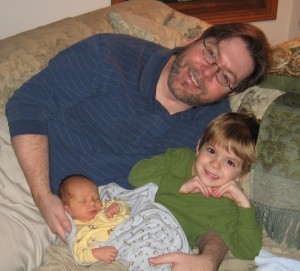
Clockwise from top: Me, the Squirrel Boy, and the C-in-C, circa 2008.
September 3, 2012
I will not say I will not read your f*cking (manu)script
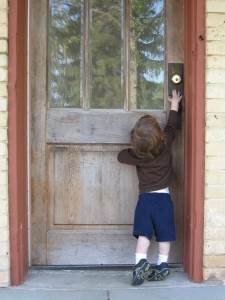
An aspiring writer at Josh Olson’s door. “Please, suh, may I have some critique?”
WARNING: This post contains strong language. It actually has to, because…well, you’ll see.
Every so often, someone posts a link to this, a 2009 article by screenwriter Josh Olson bemoaning the fact that struggling writers ask him to read their work. If you haven’t, take a minute and read it. I’ll wait.
I’ll say this up front: if this article, in its content, tone, and execution, is an accurate representation of Olson’s personality, then I think he’s an asshole, because only an asshole would feel the need to pro-actively announce that he won’t read your fucking script. Only an asshole would think anyone cares.
However, the article keeps getting reposted, and some fairly accomplished people don’t feel that his self-righteousness self-pity is out of line. I do, and not just because I try not to be an asshole. I say it because, we should be better than that.
Who are ‘we?’ The ones lucky enough to do this for a living.
Last year, I filled in for a writer on a critique panel at a local convention. He’d been called away, and one of the other panelists asked me to take his spot. I did, and hopefully the writers who were brave enough to read things got some useful criticism. Afterwards, I was outside with the panelist who’d asked me to fill in, and two young women approached us. They apologized for missing the panel, and asked if we could still look at their submissions. My friend politely said no, that the panel was over and that, essentially, was that. I went along with it.
But I haven’t forgotten it, and I still feel bad about it, because it was the wrong thing to do. I have no doubt what the girls had to show us would have been pretty bad, but that’s not the point. The point is, I missed a chance to give back, to pay forward, to essentially behave in the exact opposite manner from Josh “I Will Not Read Your Fucking Script” Olson. Because unlike Olson, I remember what it was like to be on the other side of the line. I recall how it felt to have your nose pressed to the glass.
Recently author Pat Cardigan reposted Olson’s article on Facebook, and in the comments legendary author Jane Yolen defended Olson’s attitude, relating some pretty awful tales of people approaching her, one even at her husband’s funeral. I think we can all agree that that’s reprehensible behavior, but even if it is, does that mean we should be assholes back?* Does that mean we should announce to everyone, even people who haven’t asked, that we won’t read their fucking script because we are, as Laurence Olivier once claimed about himself, too fucking grand?
Sure, if you’re pushy and obnoxious, I’ll turn you down. If I’m busy with my own stuff, I’ll turn you down. If my kids need my attention, or I have a prior commitment, I’ll turn you down. What I won’t do is brag about how I’m turning you down before you even ask. And most importantly, I’ll try not be an asshole when I do it, no matter how obnoxious you are. Why? Because there are enough assholes in the world.
That’s the whole point of this, my whole plea to the Josh Olsons out there: you don’t have to be an asshole about things.
And that is something all writers, with the exception of Harlan Ellison, should be able to do.
*Just to be clear, I’m not calling Jane Yolen an asshole. Not at all. I sat beside her in the audience of the very first convention panel I ever attended, before I’d been published myself, and she was delightfully friendly. And truthfully, if you’re so ill-mannered that you approach someone at a funeral, you deserve what you get.
August 27, 2012
The Girl on the Cover
This post is about cover art, and specifically the way characters are portrayed in it.
I want to say up front, I’m not being critical of my own covers. A cover is designed to make potential readers check out the book; once they do, it becomes the writer’s responsibility to keep them interested. It goes without saying that often the covers don’t depict the characters as the author sees them, and over time, even the publisher’s idea of what a character looks like can dramatically change:
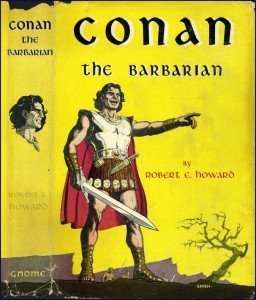
The original rather slap-happy Conan…
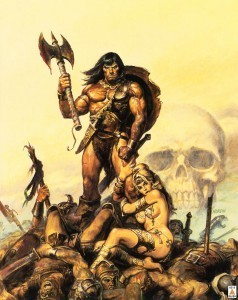
…and the grim Conan we know now.
When I was writing Wake of the Bloody Angel, I introduced a new, major character, Jane Argo. She’s a sword jockey like Eddie, but she’s also a former pirate hunter, and before that, a pirate herself. Here’s how I describe her, in Eddie’s voice:
She was my height, busty and wide-hipped but with a wasp-narrow waist. Her broad shoulders were as muscular as a galley slave’s, and she wore a large ring on ever finger. Her hair fell past her shoulders, and only the faint streaks of gray and slightly deeper smile lines indicated she was older than she sounded.
One day I stumbled across this picture of musician Ginger Doss,* and realized this was pretty much exactly how I saw Jane in my head.
The publisher, or rather artist Larry Rostant, who’s done my last three covers, saw her this way.
To be fair, Mr. Rostant may never have never read the book, which is not an essential part of his job description. And again, it’s a great cover illustration as far as its function goes, which is to induce someone to pick up the book: it has atmosphere, sexiness and style. On its own, it’s a beautiful image. But I’ll leave it to you, the reader, to decide what this dichotomy represents. In professional publishing, the author has virtually no say-so in the cover. It’s decided by marketers, whose job it is to create an image that will attract attention. And certainly the slender redhead with the no-nonsense scowl does that (as several male readers have informed me).
But here’s the thing: one reason I wrote Jane as a physically big woman, with visible muscles and a hint of grey in her hair, was to break away from the idea of the “butt-kicking waif,” a trope that really annoys me. Much like the whole movie Sucker Punch, the BKW is a way to disguise male fantasy objects behind the mask of alleged female empowerment. Buffy is the prime example, maybe even the originator, but it’s become the default setting for SF and fantasy heroines by creators who want to court the Buffy demographic (and who miss the point behind Buffy entirely). So I wanted to react against that, to show a woman who is both as intelligent as the hero, but also maybe a little stronger, physically. And to have none of that make her any less attractive.
The reviews, thankfully, have noticed that. Almost all of them mention Jane, and my favorite comment so far is this one :
Jane’s an unusual character in that she’s the muscle of the operation. Bledsoe lets her be tough without ever questioning her ability to be so. There’s never a comment by another character that suggests she’s strong for a girl [emphasis in the original].
I have a hard time seeing the woman on the cover fitting that description. She’s beautiful, certainly. She’s got a great expression, too. She fully fits into the overall image. But as with Eddie, I wonder if a more visually accurate presentation would make any difference in sales. And if so…in which direction?
*Ms. Doss knows that she was my image of Jane Argo. Thankfully, she’s delighted.
August 20, 2012
Writers and the Throne
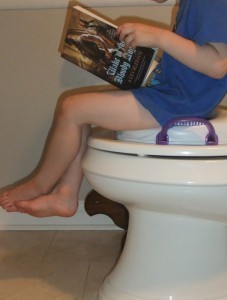 It’s a well-known maxim that creative types, for the most part, get no respect from their families. Even Jesus knew this, saying (according to King James), “A prophet is not without honour, but in his own country, and among his own kin, and in his own house” (and no, I’m not comparing myself to Jesus). Thankfully, in my own house I’m fairly well tolerated, especially when I clean the bathrooms every week. And most of the authors I know have spouses or partners who actually like having a writer around.
It’s a well-known maxim that creative types, for the most part, get no respect from their families. Even Jesus knew this, saying (according to King James), “A prophet is not without honour, but in his own country, and among his own kin, and in his own house” (and no, I’m not comparing myself to Jesus). Thankfully, in my own house I’m fairly well tolerated, especially when I clean the bathrooms every week. And most of the authors I know have spouses or partners who actually like having a writer around.
But go further afield, and you find people who saw you grow up, and who now make it their business to remember every social misstep, every embarrassing faux pas, every failure of your childhood and look for any opportunity to remind you of it as an adult. Or go out of their way to denigrate what you’ve dedicated yourself to as somehow less than a “real job.”
An example from my own life: last spring, I took my family back to Tennessee, so we could go to Easter sunrise service with my mom. Returning “home” is always problematic for me, because the tiny town I grew up in, and that a surprising number of my family still call home, has decayed over the years to a hamlet of old people, abandoned houses and (probably) hidden meth labs. The school burned down, the grocery store and diner closed, even the truck stop went out of business. All that’s left are one red light, a convenience store and a notorious speed trap. Still, we went, because it’s my mom; she refuses to travel, so if I want her to see her grandsons, I have to bring them to her.
While I was there, one of my relatives told me that he finished reading one of my books. Now, this would be unusual enough, given that I write books everyone in my family considers “weird” (i.e., fantasy and horror). But lest you think I’ve made some sort of breakthrough, he also felt the need to tell me where he finished it.
In his words, “On the crapper.”
That’s right: he wanted to make sure I knew my book, and his shit, were in very close proximity.
I’ve turned this little moment over in my mind ever since. If he’d cackled gleefully and pointed at me, the way people did when I was a kid, I’d know how to take it. If he’d punched me in the face, the way one of my cousins once did for being “weird” (I was reading a Star Trek book at the time) then I’d also comprehend his meaning. But maybe, in some twisted way, he meant it as a compliment. Maybe he wanted to show me that my book had brought joy to his personal sanctum sanctorum. Maybe experiencing a good book, and a good bowel movement, are both rare experiences for him.
Still, I’d hesitate to recommend sharing this sort of thing to the family of other writers. Because it’s also a mental image I never, ever wanted.
August 16, 2012
George Lucas and Elvis: Echoes from 1977
Thirty-five years ago, two things that fundamental changed my life happened in the same summer.
In May, Star Wars was released.
In August, Elvis Presley died.
The arrival of Star Wars turned the thing that everyone in my small town mocked, that had gotten me teased and beaten up, into the hippest thing in the world. Spaceships, aliens and robots were suddenly cool. Everyone went to see the movie, and multiple times, too. I learned a great deal of the dialogue by heart, something my kids have made me promise not to demonstrate when their friends are over. I collected everything I could find about the movie, desperate to understand what made it so awesome. Even then, I knew I wanted to be a creator, not just a consumer. My friends all wanted to be Han Solo or Luke Skywalker, but I wanted to be the next George Lucas.
On the other hand, Elvis was something that was practically in the water. We lived an hour north of Memphis, and so I’d heard Elvis all my life. The album I recall listening to the most (and we’re talking vinyl album here) was 1970′s Elvis in Person at the International Hotel, Las Vegas, Nevada. It included live and rather self-mocking versions of his greatest hits, along with covers of the Bee Gees hit, “Words.” Yes, Elvis covered the Bee Gees. He was a fact of life for me, and when he was gone, it created a vacuum that, to this day, occasionally strikes me anew with its poignancy. It’s not that I don’t understand what happened–believe me, I’ve read enough books about him to grasp the tragedy that his life became–it’s that his fall was so immense, and so thorough, and happened so young (he was only 42 when he died) that its full scale takes a long time to be fully appreciated.
As I sit here listening to Elvis (specifically, to the awesome collection Greatest Jukebox Hits, the CD I’d recommend to anyone looking for a one-disc sampler of what made the King so great), I suddenly wondered what George Lucas thought of Elvis’s death back then. Did he glimpse his own future in it? Because except for the drug abuse and dying young, he’s pretty much done the same thing.
Consider:
Like Elvis, George is financially successful, even now. Elvis packed arenas until the day he died.
Like Elvis, George’s later work is derivative and shallow compared with his earlier breakthrough creations.
Like Elvis, George’s original fans consider themselves betrayed by what he’s become*.
Like Elvis, George refuses to listen to critics. Elvis had manager Tom Parker always preaching the easiest, least challenging path. George was his own Colonel Tom.
Like Elvis, George is willingly insulated from the outside world by his wealth and position of power.
And, the most obvious,
Like Elvis, George has become physically fat and morally complacent.
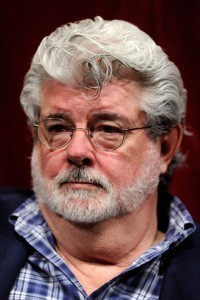
Both men are legends. Both men changed the world. But if he’s not careful, George will become as big a punchline, as big a joke, as Elvis (consider the recent Gotye parody).
And both men, ultimately, brought their sad status on themselves.
*This didn’t really happen during his life, true. But once he died, and we began to really assess what he’d given us in those last years, the backlash was, and is, enormous. That’s why fat, Vegas-era Elvis is such an easy punchline.
August 13, 2012
Guest blog: Cyrus Webb on interviewing authors
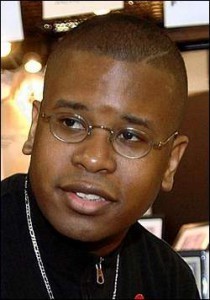
Radio host Cyrus Webb
I’ve been a guest on the Conversations online radio show twice, and both times have been a blast. Host Cyrus Webb interviews not only authors but musicians, sports figures, musicians and anyone he finds interesting. I asked him to write a bit about what makes a good guest, and how an author should prepare for a radio interview.
***
Getting a book published has to be one of the great achievements of someone who loves to write. They have labored with their body of work for some time, been involved in the editing process and then put it out for the world to enjoy. Having it available is one thing. Letting people know about it is quite another.
The internet has done a great deal to help authors publicize their work in various forms, but there is nothing like having someone on the outside share the message of the author and their work. This is where the media can be beneficial. Setting up an interview to discuss what you have written and how others can get it can be an important step to spreading the word. The key is to be both prepared and make sure that you do your part to make it a success.
Reaching out to the press can seem daunting, but I have found that just as authors want to share their work the press is looking for stories to feature. There are many ways to make sure that you get noticed and get attention. If you are looking to be featured locally on the radio it can be as easy as contacting the station and pitching yourself and your book. I have found that this works best if you can tie it into something that is already considered newsworthy in your area or that gives an angle that will both get the attention of the station and its audience.
If you are looking to reach a larger audience, once again the internet can be invaluable. There are thousands of internet radio shows out there. The key is finding those that will fit you and your book and that will allow you to present yourself in the best light.
Let’s say that you’ve either found a show on your own that you are interested in or that you are contacted by someone interested in interviewing you. That is only the beginning. You need to make sure that you are prepared to use whatever amount of time you have to get the important aspects of yourself and your book out there. Preparation is the key. Know the show. Know the host and something about their interviewing style. Most importantly make sure they know something about you. This will ensure that there is a real give and take during the interview.
Some talk shows like to have prepared questions for the guest. Others, like myself, prefer a more free-flowing conversation. Make sure you know that type of information before the interview, and that the needed information is provided.
During the interview make sure to answer the questions that are asked, giving sharp but pithy responses. You don’t want to talk too much, but you definitely want to make sure you answer completely. Not everyone listening to the interview may buy the book initially, but make sure you get your website or how additional information can be found in the discussion. It can be as easy as saying. “On my website xyz.com I have an excerpt from the first chapter” or “If you visit my Facebook page each week I have a book giveaway”. This will let listeners know where you are and how they can find out more.
In the end, have fun with it! Interviews are one of the rewards for doing something great, and by publishing your book you have done just that. Make sure you are taking advantage of every opportunity to share your work with others, and it will make the journey that much more enjoyable.
***
OFFICIAL BIO: Cyrus Webb is the President of Conversations Media Group, home of Conversations Book Club, Conversations Magazine and Conversations LIVE Radio Show. You can find out more information about him at www.cyruswebbpresents.com. He can be reached at cawebb4@juno.com.

